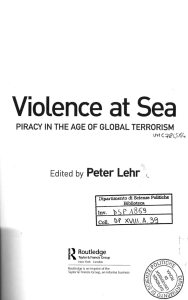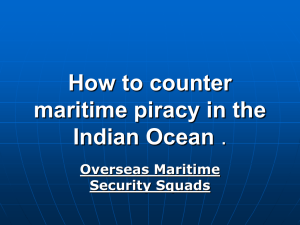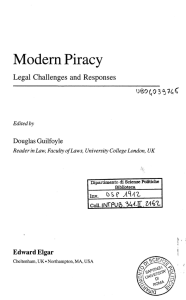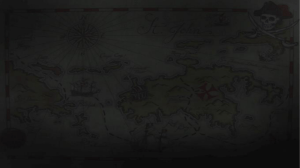Maritime Piracy
advertisement
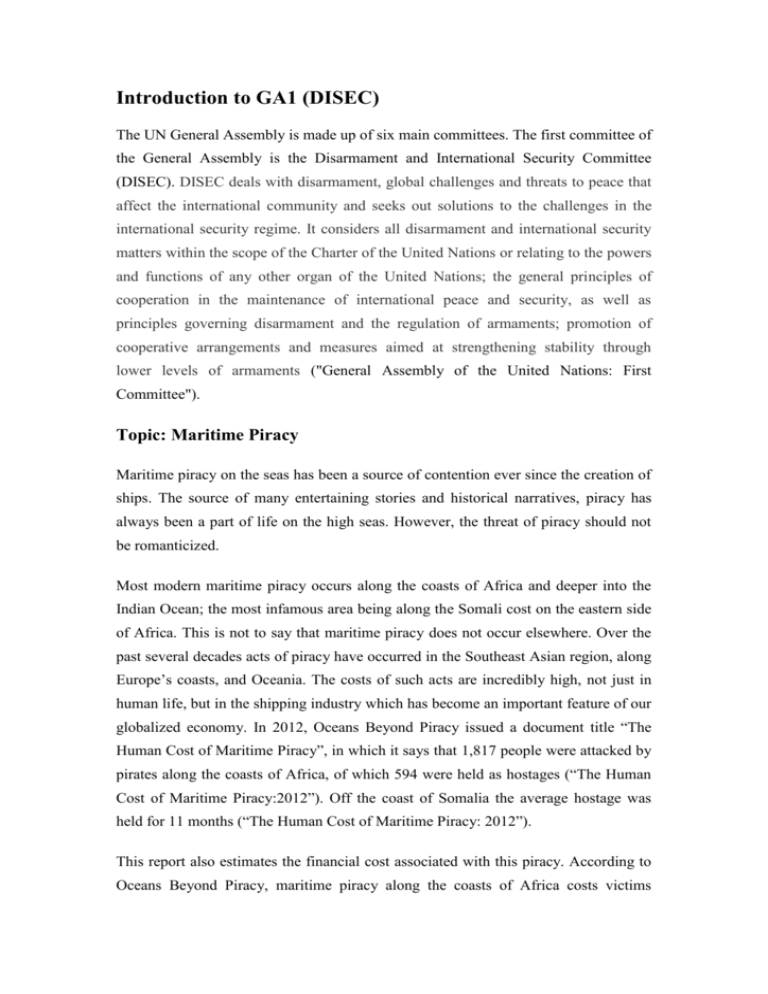
Introduction to GA1 (DISEC) The UN General Assembly is made up of six main committees. The first committee of the General Assembly is the Disarmament and International Security Committee (DISEC). DISEC deals with disarmament, global challenges and threats to peace that affect the international community and seeks out solutions to the challenges in the international security regime. It considers all disarmament and international security matters within the scope of the Charter of the United Nations or relating to the powers and functions of any other organ of the United Nations; the general principles of cooperation in the maintenance of international peace and security, as well as principles governing disarmament and the regulation of armaments; promotion of cooperative arrangements and measures aimed at strengthening stability through lower levels of armaments ("General Assembly of the United Nations: First Committee"). Topic: Maritime Piracy Maritime piracy on the seas has been a source of contention ever since the creation of ships. The source of many entertaining stories and historical narratives, piracy has always been a part of life on the high seas. However, the threat of piracy should not be romanticized. Most modern maritime piracy occurs along the coasts of Africa and deeper into the Indian Ocean; the most infamous area being along the Somali cost on the eastern side of Africa. This is not to say that maritime piracy does not occur elsewhere. Over the past several decades acts of piracy have occurred in the Southeast Asian region, along Europe’s coasts, and Oceania. The costs of such acts are incredibly high, not just in human life, but in the shipping industry which has become an important feature of our globalized economy. In 2012, Oceans Beyond Piracy issued a document title “The Human Cost of Maritime Piracy”, in which it says that 1,817 people were attacked by pirates along the coasts of Africa, of which 594 were held as hostages (“The Human Cost of Maritime Piracy:2012”). Off the coast of Somalia the average hostage was held for 11 months (“The Human Cost of Maritime Piracy: 2012”). This report also estimates the financial cost associated with this piracy. According to Oceans Beyond Piracy, maritime piracy along the coasts of Africa costs victims between five and seven billion dollars in just 2012 alone (“The Human Cost of Maritime Piracy: 2012”). There are many reasons for this cost, much of which we do not think about as often. These costs to the victims of piracy include ransoms and recovery, increased insurance, security equipment, military operations, and the re-routing of goods (“The Human Cost of Maritime Piracy: 2012”). One of the largest financial burdens of maritime piracy comes from the re-routing of goods using shipping vessels to transport them. When piracy occurs, ships must avoid the area in order to avoid being boarded by pirates themselves. This increases the amount of fuel these vessels must use, therefore increasing the price of shipping costs and the ultimate price of the goods when sold to the consumer. Many countries also lose significant amounts of money due to decreased trade (“Maritime Piracy”). In 2010, Egypt lost about 642 million US dollars because ships that would have gone through the Suez Canal and paid Egypt a fee to do so were forced to re-route through the Gulf of Aden (“Maritime Piracy”). Another loss occurs in the tourism and fishing industries around the coast. In 2010, the Seychelles, an island nation off the East coast of Africa, lost approximately 6 million US dollars due to piracy’s effects on their shipping and fishing industries (“Maritime Piracy”). Considering the GDP of the Seychelles is approximately one billion dollars total, a six million dollar decrease is no small drop in the bucket (“Seychelles”). Beyond the economic concerns of maritime piracy, the international security concerns are plainly obvious. Since many acts of piracy occur in international waters, it is in the power of international organizations such as the United Nations to address the issues of maritime piracy. The legality of such acts is undoubted. In 1982 the United Nations Convention on the Law of the Sea (UNCLOS) provides clear statements that maritime piracy can be repressed under international law (such statements can be found in articles 100 to 107 and 110) (“Piracy Under International Law”). UNCLOS declares that: “all states have an obligation to cooperate to the fullest possible extent in the repression of piracy (Article 100) and have universal jurisdiction on the high seas to seize pirate ships and aircraft, or a ship or aircraft taken by piracy and under the control of pirate, and arrest the persons and seize the property on board (Article 105) (“Legal Framework”).” Herein lays a problem that the international community must solve: if every state has the right and obligation to stop maritime piracy, which one will spend the money to do it? Since international waters are what we can consider common areas for the use of all states, then a phenomenon called the tragedy of the commons ensues. The tragedy of the commons describes a situation in which multiple people have the right to use something, but no one feels the responsibility to use it effectively because they do not own it (McFadden). Since no one takes ownership of this shared resource, then no one is willing to use their personal resources to maintain and improve it (McFadden). This situation has occurred throughout history and is applicable to modern international waters. The costs of eradicating piracy are enormous. Most states would like it done, but no single state can, or is willing, to do it themselves. It is important when discussing solutions to maritime piracy to ensure that all such solutions are adaptable to any waters where piracy can occur. In recent years the majority of pirate incidents have occurred along the Somalian coast, but this can, and has, happened in many other parts of the world. No area of ocean is completely safe from piracy. Questions to Consider: 1. How can the international community eradicate piracy? 2. Who will be responsible for handling situations of piracy, and how will these states be held accountable? 3. How will the international community overcome the tragedy of the commons in regards to international waters? 4. Should the United Nations Convention on the Law of the Seas (UNCLOS) agreement be revised to better address international concerns? Works Cited ""General Assembly of the United Nations: First Committee." General Assembly. The United Nations, 2013. Web. 31 July 2013. "Legal Framework for the Repression of Piracy Under UNCLOS." Oceans and Law of the Sea. United Nations, n.d. Web. 01 July 2013. "Maritime Piracy Costs Global Community up to $12 Billion a Year." Eye For Transport. N.p., 20 Jan. 2011. Web. 01 July 2013. McFadden, Daniel. "The Tragedy of the Commons." Forbes. Forbes Magazine, 10 Sept. 2001. Web. 01 July 2013. "Piracy Under International Law." Oceans and Law of the Sea. United Nations, n.d. Web. 01July 2013. "Seychelles." The World Factbook. Central Intelligence Agency, n.d. Web. 01 July 2013. "The Human Cost of Maritime Piracy: 2012." Oceans Beyond Piracy. N.p., n.d. Web. 01 July 2013.

